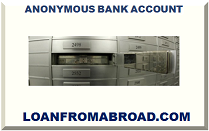
ANONYMOUS UNTRACEABLE SECRET NUMBERED BANK ACCOUNT 2024
BANK ACCOUNT WITH NO NAME
An anonymous bank account in 2024 is by definition a secret or untraceable bank account without name, that is a type of financial account where the identity of the account holder is kept confidential, typically by using numbers or codes instead of names to identify the account.
The anonymous bank account, called also numbered bank account, because it is identified solely by a number, making it difficult to ascertain the identity of the account holder, a practice that originated in Switzerland but is now less common and more regulated.
The anonymous bank account is opened by people for a variety of reasons, ranging from legitimate desires for privacy and security to more questionable motives such as tax evasion, hiding assets during legal proceedings, or concealing illicit gains.
Opening an anonymous bank account has the primary aims to maintain financial privacy, as it allows individuals to keep their financial affairs private from government entities, corporations, and even personal acquaintances.
The secret or untraceable bank account without name enjoys a popularity for asset protection; it is often used to safeguard assets from legal judgments, creditors, or political instability in the account holder's home country.
Behind anonymous bank accounts is a controversial but common motivation such as tax optimization or evasion, as they can be used to hide income or assets from tax authorities, thereby reducing tax liabilities illegally.
Anonymous bank accounts are also utilized for facilitating illicit activities, such as money laundering, by making it harder for authorities to trace the flow of funds related to criminal enterprises.
Anonymous bank accounts in 2024 have been increasingly scrutinized and regulated globally, with many countries and international organizations implementing stringent measures to combat their misuse for illegal activities.
1. Are anonymous bank accounts really existing?
No, traditionally, anonymous bank accounts, such as numbered accounts, were available in certain jurisdictions. However, due to stringent global financial regulations, especially those focusing on preventing money laundering and terrorism financing, truly anonymous accounts are now virtually non-existent. Banks are generally required to know the identity of their customers.
While the concept of an anonymous bank account still holds a place in popular culture, in reality, most countries have strict regulations requiring the identification of account holders. This is to ensure transparency and to combat illegal activities. However, some private banks used to offer a form of account where identities were known only to select bank employees.
2. How do KYC and AML rules impact the opening of anonymous bank accounts?
KYC and AML regulations have a significant impact on the ability to open anonymous bank accounts. These regulations require financial institutions to verify the identity of their clients and understand the nature of their financial activities. This makes it almost impossible for banks to offer anonymous accounts while complying with these rules.
The implementation of stringent KYC and AML rules across the globe has essentially eradicated the possibility of opening anonymous bank accounts. Banks must conduct thorough background checks on their customers, monitor transactions, and report suspicious activities, all of which necessitate knowing the customer's identity.
3. How have international regulations like FATCA and CRS affected anonymous banking?
The Foreign Account Tax Compliance Act (FATCA) and the Common Reporting Standard (CRS) have significantly impacted anonymous banking by requiring financial institutions to report information about foreign account holders to their respective tax authorities, thereby reducing secrecy.
FATCA and CRS have created a global network of information exchange among tax authorities, making it difficult for individuals to hide assets or income in anonymous accounts to evade taxes.
OVERSEAS STUDENT LOAN CHRISTMAS LOAN LOAN BROKER OVERSEAS PRIVATE LOAN WITH GUARANTEE OVERSEAS MORTGAGE BUSINESS LOAN PERSONAL LOAN TAX ON LOANS WITHOUT COLLATERAL MICROFINANCE P2P LOAN CAR LOAN WITHOUT CREDIT CHECK CREDIT CARD DEBT CONSOLIDATION WITHOUT JOB WITH BAD CREDIT WITHOUT UPFRONT FEE FOR DISABLED ISLAMIC LOAN LIST OF BROKER LEASING FROM ABROAD LOAN FROM OVERSEAS BANK CHINA THAILAND EUROPE FOR MIGRANT FOR WOMEN CAR FOR FOREIGNER ELECTRIC BIKE LOAN STUDENT LOAN REPAYMENT FROM ABROAD LOAN FROM INDIAN OVERSEAS BANK FOR MASTER LOW INCOME LOAN OVERSEAS CROWDFUNDING FOR FARMER OVERSEAS PAYDAY LOAN WITH NEGATIVE RATE OVERSEAS BANK ACCOUNT OFFSHORE BANK ACCOUNT ANONYMOUS BANK ACCOUNT OFFSHORE BANK ACCOUNT ANONYMOUS BANK ACCOUNT GERMANY LOAN SWISS BANK ACCOUNT LUXEMBOURG ACCOUNT PANAMA ACCOUNT DUBAI BANK ACCOUNT LOAN FOR US CITIZEN LOAN FOR BRITISH SWITZERLAND LOAN MORTGAGE FOR ALIEN LOAN FOR HOUSEWIFE FOR FOREIGNER UK LOAN LIST OF GERMAN BANKS KREDIT OHNE SCHUFA USA LOAN AUSTRALIA LOAN FRANCE LOAN BELGIUM LOAN NO PROOF OF INCOME WITHOUT INTEREST START-UP LOAN MAURITIUS MOROCCO NEW ZEALAND LIST OF SWISS BANKS LUXEMBOURG LOAN LIST OF UK CAR LEASING MONACO LOAN SAUDI ARABIA QATAR LOAN FROM GOVERNMENT ANDORRA LOAN FOREIGN INSURANCE FOREIGN CAR INSURANCE FOREIGN HEALTH CARE FOR EXPATRIATE FOR CROSS-BORDER FOR NRI BLACKLISTED LOAN MOTORBIKE LEASING LICHTENSTEIN LIST OF INTERNATIONAL BANKS CANADA LOAN WITHOUT SCHUFA ISRAEL LOAN ITALY MORTGAGE DUBAI LOAN LOAN FOR REFUGEE LEASING FOR FOREIGNER SPAIN PORTUGAL LEASING GERMANY BKR LOAN